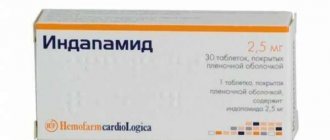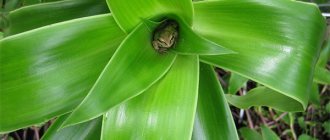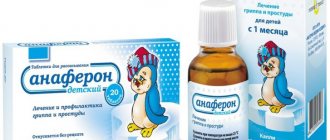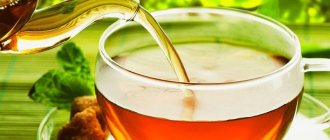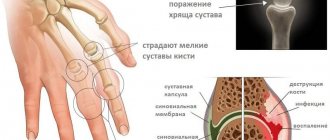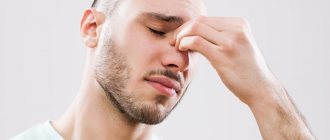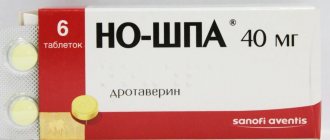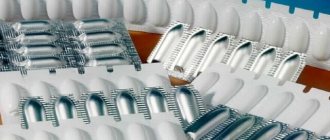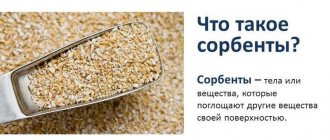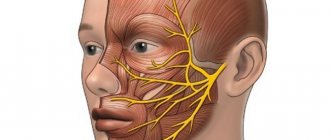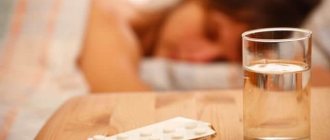A restless child of any age is a rather serious problem, exhausting the patience of parents and often irritating others.
Modern pharmacology is ready to provide a wide selection of drugs that can calm the most violent child or teenager. But how advisable is it to resort to different groups of sedatives in pediatric practice? Let's try to figure it out.
Sedatives for children
Sedatives (sedatives) are designed to gently regulate the balance between excitation and inhibition in the cerebral cortex. Most of them are herbal preparations, but there are also synthetic ones. Today, combination drugs in teas or tablets are very popular. This group of drugs acts much more mildly than tranquilizers or sleeping pills, and can enhance their effect.
Why do babies cry
Some inexperienced parents believe that a baby's crying is a way of manipulation.
The child screams to be picked up. This is wrong! The baby is not yet developed enough to cry “on purpose.” But hunger, thirst, and a wet diaper can cause unpleasant emotions in a little person. Some children tolerate it calmly, while others immediately communicate their discomfort by crying loudly. Fear is another reason for children to cry. The baby just recently came into this world. He may be frightened by unfamiliar sounds and smells, the absence of his mother nearby, and strangers' faces. To calm the baby in this case means to do everything so that the little person grows up to be a normal, full-fledged person. After all, many complexes and mental disorders come from childhood.
If a baby cries for every reason, it can be exhausting for parents. First of all, you need to consult a pediatrician. A specialist can advise what is effective for infants. But it is recommended to use medications only in the most extreme cases. There are many alternative methods you can use to distract your baby.
Reasons for violations
Dyssomnia, sleep disturbance in children under one year of age can be provoked by various somatic, physiological, psychological, and age factors.
Causes excitement:
- hypersensitivity;
- sudden change of situation;
- air stuffiness, stuffiness in the room;
- a turbulent situation in the family if parents are in conflict.
In the first months, the child’s body reacts sensitively to any negative external phenomena. Immunity is still at the development stage.
Restless behavior may be caused by bloating and tightness in the abdomen. In such cases, it is worth helping the baby and taking measures to remove gases from the intestines.
The cause may be an allergic reaction to food, so when breastfeeding mothers need to first reconsider their diet.
Physiological causes of the problem:
- teething;
- diaper rash;
- hunger;
- heat, high humidity indoors;
- uncomfortable clothes with rough seams that make it difficult to sleep peacefully.
Psychological reasons:
- nervous system disorder;
- stress;
- difficult atmosphere in the family;
- emotional overstimulation during the day.
In a small person, the period of sleep and wakefulness may be disrupted or the mechanism of falling asleep may be incorrectly formed. Until 1 year of age, the digestive system is formed, so a common reason for lack of rest is intestinal colic and regurgitation of gastric juice.
Types of sedatives for children
Psychotropic drugs relax the nervous system. Sedatives for children regulate the processes of excitation and inhibition in the cerebral cortex, reducing the reaction to external stimuli.
These medications control the child’s daily activity and make sleep deep and long.
Types of sedatives recommended in childhood:
- Medicinal sedatives. Suitable for non-pathological changes in the psycho-emotional background, they have several forms of release. For example, Glycine (tablets), sodium bromide (solution), Diphenhydramine (powder) are highly effective.
- Homeopathic medicines. They contain plant components and glucose, which improves metabolism and reduces nervous excitability. These medications are produced in the form of drops (Valerianahel), tablets (Dormikind), teas, and mixtures.
- Herbal remedies. Calming herbs gently relax the nervous system, relieve physical stress, and improve a child’s sleep. Pediatricians prescribe tea with lemon balm, a decoction with valerian and motherwort.
- Tranquilizers (anxiolytics) and antipsychotics. Potent sedatives for children, which are prescribed by neurologists for complicated nervous disorders and symptoms of depression.
| Name of the medication | Components | Pharmacological properties | Treatment regimen |
| Pantogam |
| Anticonvulsant, nootropic, sedative effect. The drug calms the nervous system and stimulates mental activity. |
The course of treatment is 1–3 months. |
| Tenoten for children | Microcellulose, magnesium stearate, lactose, mixture of homeopathic dilutions C12, C30 and C50. | Relieves anxiety, stimulates intellectual activity, helps cope with emotional stress. | You need to dissolve 1 tablet under the tongue. 1–3 times/day. The course of treatment lasts several months (according to medical indications). |
| Phenibut | Phenibut, potato starch, lactose, calcium stearate. | Suppresses unreasonable anxiety, helps in the fight against internal fears and worries. |
|
| Nootropic | Glycine, ginkgo biloba and gotu kola extract, vitamins B3, K1, B5, B6, B12. | Increases performance, stimulates vascular tone, relieves emotional stress, and removes conflict. | You should take 1 capsule with meals 1 time/day. The course of treatment is 20 days. |
| Glycine | microencapsulated glycine. | Reduces the degree of vegetative-vascular disorders, conflict, and child aggression. | The patient is prescribed 0.5–1 tablet. 2–3 times/day depending on the age of the child and the nature of the pathology. |
| Name of medicinal plant | Recipe Ingredients | Cooking method | Rules of application |
| Motherwort |
|
| Take 100 ml of the decoction chilled, regardless of meals. The course of treatment is long. |
| Chamomile, valerian |
|
| Take 100 ml of decoction orally in the morning and evening, regardless of meals. The course of treatment is 2–3 weeks. |
| Melissa |
|
| Give your child lemon balm tea as his main drink. |
| Product name | Compound | Mechanism of action | Treatment regimen |
| Notta (drops, tablets) | Sowing oats, coffee tree, chamomile, phosphorus, zinc valerinate. | Removes nervous excitability of the child, improves sleep. |
The course of treatment is from 1 to 4 months. |
| Valerianahel (drops) | Humulus lupulus, Ammonium bromatum, Crategus, Melissa officinalis, Hypericum perforatum, Avena sativa, Acidum picrinicum, Camomilla recutita, Kalium and sodium bromatum, ethanol. | Helps with insomnia, neuroses, neurasthenia, increased excitability in childhood. |
The course of treatment is more than 1 month. |
| Kindinorm (granules) | Chamomilla, cuprum, staphysagria, valerian, Calium phosphoricum, Calcium hypophosphorum. | Improves concentration and successfully combats nervous excitability of the child. |
|
| Liovit (tablets) | Motherwort, valerian, hawthorn, coriander, lemon balm, nutmeg, sugar, starch, oats, calcium stearate, PVP. | General strengthening, sedative, sedative effect. | You need to take 1-3 tablets. three times a day during meals. |
| Baby-sed (pellets) | Bryonia, Chamomilla, Staphysagria | Normalizes the sleep phase, improves the child’s mood, calms the nervous system. | Dissolve 5 granules under the tongue before meals, preferably in the morning. The course of treatment is 2 weeks. |
The choice of drug depends on the degree of its effectiveness and the risk of side effects (especially an allergic reaction), so you need to coordinate the use of the drug with your doctor. Preference is given to plant-based products.
Synthetic drugs are permissible for use only for the treatment of serious psychiatric and neurological diseases.
| Name | Compound | Action | Contraindications |
| Calm down | Green tea, alfalfa, thyme, motherwort, rosehip, peppermint, lemon balm, kelp extract powder | Normalizes sleep patterns, calms the neuromuscular system | Allergy to herbs composition |
| Hipp | Linden blossom, chamomile, lemon balm | Calms, normalizes sleep, makes it easier to fall asleep | Age up to 2 weeks |
| Grandma's basket | Mint, lemon balm, thyme, fennel, rose hips, chamomile | Calms before bedtime, relieves spasms and colic | Age up to 1 month |
| Name | Compound | Action | Contraindications |
| Pantogam | Calcium hopantenate | Stimulates metabolism, reduces excitability, activates physical and mental activity, has sedative, nootropic, anticonvulsant effects | Intolerance to the components of the composition |
| Viburkol | Belladonna, chamomile | Anesthetizes, eliminates agitation, convulsions | |
| Glycine | Glycine | Has sedative, antidepressant effects | |
| Citral | Citral | Eliminates inflammation, soothes | |
| little hare | Barberry, hawthorn, cumin, lemon balm, motherwort, mint, chamomile, valerian | Relieves nervous excitability |
Sedatives are psychotropic drugs that have a general sedative effect on the central nervous system. They gently restore the balance of excitation and inhibition processes in the cerebral cortex, reducing the severity of the reaction to external stimuli.
Sedatives reduce daytime activity and can be used as sleep aids. They facilitate the onset of natural night rest, making it deeper and longer.
Medicines that have a sedative effect include:
- herbal products (extracts of valerian, peony, motherwort, passionflower);
- preparations containing magnesium and bromine salts (sulfate, lactate, magnesium citrate, potassium and sodium bromide);
- medications based on barbituric acid derivatives (barbiturates in minimal doses);
- tranquilizers (anxiolytics) and neuroleptics.
In addition, 1st generation antihistamines and some painkillers have a sedative effect. Before giving any sedatives to children, you should consult a doctor.
All sedatives are classified into types according to different criteria, for example, according to composition and principle of action they are:
- Pharmaceutical medicines are recognized and actively used by doctors of official medicine. They are prescribed to children with disorders of the nervous system. In turn, medications are divided into: synthetic ones - they have a more pronounced effect, but have more adverse reactions; herbal - the safest type of drugs for nervous disorders;
- homeopathic remedies are a highly diluted concentrate of raw materials. They operate on the principle of “like cures like.” They involve the use of the healing properties of plants, animals and products.
All sedatives are classified according to the form of release into the following:
- drops;
- capsules;
- herbal collection for preparing decoctions;
- pills;
- suspensions;
- syrup;
- solution for injection;
- powders for preparing suspensions.
Suppositories are usually used to treat nervousness in infants.
For the treatment of newborns and infants, sedatives in the form of suppositories and syrups are usually used. Children 1-2 years old are allowed to give soothing teas.
From the age of six you can use tablets. The capsule form should be chosen if the child is already 12 years old. Also, all sedatives are divided into long-acting and short-acting.
Herbs, infusions and teas
On pharmacy shelves you can see many packs of dry herbs that have a sedative effect on the human central nervous system. These herbs include:
- chamomile;
- mint;
- Linden;
- Adonis;
- yarrow;
- valerian;
- sagebrush;
- swamp cudweed;
- hawthorn.
They are brewed according to the instructions and drunk instead of tea no more than three times a day. Due to their mild effects and minimal contraindications, they are recommended even for the smallest children.
Article on the topic: Mint - medicinal properties and contraindications, varieties, use in cooking and folk medicine
You can purchase children's soothing tea or a collection in the form of filter bags or granules. The most popular names can be noted:
- Hipp;
- Humana;
- Calm down - a sedative mixture intended specifically for children;
- Bebivita;
- Mom's fairy tale, etc.
Pharmacies also have ready-made preparations called sedatives. Depending on the age of the child, the pharmacist will offer 1, 2, 4 or 6 collections.
Types of sedatives for children
The release form of the drug is tablets and syrup. This is a composition based on plant extracts:
- Valerian rhizome extract – normalizes sleep and has a mild sedative effect. Patients become less irritable. The disadvantage of this component is that it can provoke the development of drowsiness;
- lemon balm extract enhances inhibitory processes in the nervous system, making it easier for the patient to fall asleep;
- St. John's wort extract has a mild antidepressant effect - improves mood and normalizes psychological state. Non-addictive, unlike most prescription antidepressants;
- hawthorn extract improves microcirculation in the myocardium, normalizes cardiac activity, improves sleep;
- Hop fruit extract has a mild hypnotic effect.
Soothing syrup “Novopassit” has the following contraindications for use:
- children under 12 years of age;
- myasthenia gravis;
- allergic reaction to any component in the composition.
Reviews about the drug vary. Some patients note that while taking it they became less worried about irritability and began to react less strongly to conflict situations and squabbles. In addition, there is an improvement in sleep. As you know, healthy and sound sleep is the basis for the normal functioning of the nervous system.
There are also negative reviews about the syrup: patients did not notice any effect and were dissatisfied. As a rule, such a reaction is due to the fact that the dosage was insufficient or the patient violated the rules of the instructions for use when taking it. Under no circumstances should the soothing syrup be mixed with alcoholic beverages.
Herbs and infusions from them have long been used to relieve symptoms of anxiety, irritability, and insomnia. The most popular sedatives are motherwort, St. John's wort, and hops. Extracts of these herbs are included in Novopassit, but there is another high-quality soothing syrup with similar characteristics - Passiflora Plus.
This drug is not recommended for use by children under 16 years of age, as well as by persons intolerant to the components included in the composition. Reviews about Passiflora syrup are positive: patients note that it is easier to fall asleep literally on the second or third day of taking it. Anxiety decreases and is replaced by positivity and joy. Since this syrup is not so widespread on sale, there are not as many reviews about it as about its analogues.
Correction of behavior by pedagogical measures
In many cases, psycho-emotional problems that arise in a child can only be solved through pedagogical correction. To do this, it is not at all necessary to have any specific knowledge; it is enough just to carry out a number of activities. What to do first:
- create and strictly adhere to a daily routine;
- ensure that the duration of sleep is appropriate for the child’s age;
- control the time the child spends in front of the TV or computer;
- Make sure your child takes a walk in the fresh air every day;
- the family must have a normal, stable psycho-emotional environment.
It is highly desirable that the child attend kindergarten and various clubs/studios - being in the company of his own kind will stabilize his emotions and make it easier to react to some stressful situations. But here you need to be extremely careful - for some children, excessive stress has the opposite effect, the child becomes irritable and easily excitable.
Inappropriate behavior and tantrums may be associated with a violation of the child's biorhythm. After all, everyone knows that someone is a “night owl”, and someone is a “lark”, and therefore a violation of these biorhythms can easily lead to a disturbance in the psycho-emotional background. Try to understand what type of person your child is and adjust his daily routine according to his biorhythm.
Sometimes it is enough to exclude noisy entertainment in the evenings, visiting people and watching television or computer games, and sleep will become complete. In order to calm your child down in the evening, you can take a short walk in the fresh air, read a book, or draw.
Parents should be clearly aware that any sleep disturbances, behavioral deviations, unmotivated tantrums and other controversial facts should be a reason to visit specialists. Only a pediatrician, neurologist, psychologist or psychiatrist can conduct a competent examination, make an accurate diagnosis and prescribe sedatives. Making your own choice of the group of medications under consideration is at least not reasonable, and at most dangerous for the child.
Tsygankova Yana Aleksandrovna, medical observer, therapist of the highest qualification category
170, total, today
( 211 votes, average: 4.63 out of 5)
Baby's sleep: how long should a child sleep?
Chest pain: possible causes, which doctor to contact
Related Posts
Children's sleeping pills
Many children have poor sleep due to nervous disorders. To get rid of this problem, you need to eliminate factors that negatively affect the child’s psyche. The effect of treatment does not occur immediately. To combat insomnia, your pediatrician may recommend taking sleeping pills.
- Sanosan;
- Kindinorm;
- Atomoxetine;
- Bye-bye;
- Valerian tincture;
- Nervochel;
- Sonilyuks.
You need to be careful when taking sleeping pills. Some medications can cause allergies. Therefore, treatment should begin with minimal dosages. The selection of sleeping pills is carried out taking into account the existing health problem.
When overexcited, herbal medications are used (tincture or tablets of valerian, chamomile decoction). If insomnia is caused by a stressful situation, then you should give preference to homeopathic remedies. For severe neurological pathologies, synthetic drugs are used.
Folk remedies for nerves and stress
You can restore your emotional background with simple home recipes. To cope with insomnia and a feeling of constant irritation, you can take tea with mint. You can add several twigs and leaves of the plant to any drink. With regular use the condition will improve. The herb helps you fall asleep after a busy day.
An infusion with rose hips and hop cones helps stabilize the central system and blood pressure. To prepare it you will need 1 tbsp. l. the following components:
- valerian root;
- motherwort grass;
- dog-rose fruit;
- fennel fruit;
- hop cones.
Pour a glass of boiling water over the mixture and leave for half an hour. Take half a glass twice a day.
What sleeping pills are prescribed for children
Different medications are usually prescribed for different age groups. The most commonly prescribed for infants are:
- Phenibut is a nootropic drug;
- Dormikind is a German mild homeopathic remedy;
- Magne B6, which replenishes magnesium deficiency;
- pantogam syrup
Children under 3 years old grow very quickly. Sleep disorders at this age can be triggered by a lack of calcium in the body or teething. The most popular sleeping pills for this age group are:
- viburkol – from one year;
- glycine – from one year;
- kindinorm - from one year.
Children over three years old already have more adult problems associated with adaptation to kindergarten or school, excessive physical activity and stress. Sleep disturbances often appear during age-related crises, which include the 3-year-old crisis, the 7-year-old crisis, and the puberty crisis.
- Pantogam tablets – from three years;
- atomoxetine – from 5 years;
- sanosan – from 6 years;
- Alora – from 7 years;
- Persen capsules – from 12 years.
Sedatives for newborns
Often mothers encounter the first “baby” problems already in the first month after childbirth. The baby may suffer from sleep disorders, nervous excitability and other neurotic disorders. Your pediatrician may recommend an oral sedative for children. We are talking about sedative medications that are approved for use by children under one year of age.
A sedative that is suitable for newborns up to one year of age:
- Phenibut is a synthetic nootropic drug that relieves nervous tension and provides an anticonvulsant effect;
- Dormikind is a homeopathic medicine with a hypnotic effect;
- Magne B6 – replenishes the deficiency of magnesium, the main microelement of the nervous system, prescribed after a blood test;
- Pantogam is a synthetic nootropic drug that improves the functioning of the brain and the entire central nervous system;
- Bunny is a herbal sedative for children in the form of drops or marmalade.
Article on the topic: Treatment of endometrial hyperplasia in postmenopause
These are just a few of the sought-after and popular soothing remedies for little ones. In addition to the listed names, mothers respect soothing teas and infusions, but their effect is less pronounced.
It is highly not recommended to give medicine to your baby without consulting a doctor. Only a competent neurologist and pediatrician will be able to determine the cause of the baby’s nervousness and formulate the correct treatment.
ethnoscience
Sedatives, herbal teas and homeopathic medicines are not the only methods of combating children's irritability. An excellent solution is sedative herbs, which have a more gentle effect on the body and have almost no contraindications. Most herbs can be given to babies even up to one year old
- Valerian. Products based on medicinal valerian relieve nervous excitement and relieve spasms thanks to the unique combination of alkaloids and essential oils in the composition. The advantage of this plant is its versatility - doctors recommend valerian even for infants to normalize sleep and for adolescents with increased nervous excitement.
- Motherwort. As part of herbal mixtures, this herbal remedy gently soothes the young nervous system. To prepare, take equal parts of valerian, motherwort, fennel and thyme, brew 2 tablespoons of the mixture and consume chilled.
- Melissa. Decoctions based on this herb, together with linden and peppermint, relieve physical stress and relax the child’s body. Herbal teas based on linden and mint / lemon balm, thyme and valerian are effective. Both decoctions are brewed in half a liter of water, drunk as needed or take a bath with its addition.
- Water procedures in a warm, aromatic bath restore the child’s strength and prepare him for sleep. Valerian tincture and motherwort, about forty drops, are added to water for newborns. For older children, a pine bath is suitable, which relaxes the baby and relieves nasal congestion.
- Oatmeal decoction is an unusual but effective method of relieving stress. Unpeeled oats, well washed and dried, are poured with boiling water in a ratio of 200 mg per 1 liter. The broth is brought to a boil, infused for half an hour, and filtered. The finished drink is drunk before meals, honey or sugar is added to taste.
From one to three years
Having survived the baby's first year, most parents enter an era of normal life. At the same time, not all children whose nervous system malfunctioned in infancy, but was well compensated by the age of one year, received any sedatives. After all, the children's nervous system is at the stage of development and has enormous potential for self-healing.
However, some children continue to have anxiety and sleep disorders. Some develop hysterical behavioral traits. Some have fears, bedwetting or stuttering. Therefore, the problem of sedatives remains relevant at this age.
It should be remembered that part of the problems of a restless child at this age comes from social or educational neglect. Therefore, for example, replacing the problem of deprivation with a medical diagnosis and replacing full-fledged education and love for a child with sedative drugs is not only illiterate, but also criminal.
At home, folk sedatives can be prepared independently. Here are a couple of simple recipes:
- Mint and linden - take one part each of peppermint and linden flowers. Add half of the chamomile. Pour everything with two glasses of boiling water and bring to a boil in a water bath. Infuse in an enamel bowl. Give your child a tablespoon twenty minutes before bedtime.
- Mint and valerian - pour two tablespoons of mint and valerian root into two glasses of boiling water and leave for half an hour. Strain, cool, give the child a tablespoon three times a day for a week.
In addition to herbal sedatives:
| When treating serious behavioral disorders at this age, the following is used:
|
Many people believe that if a drug is herbal, it can be used without control, without restrictions, even “the more, the better” - both for infants and older children. However, medicinal plants are also medicines, the composition of which is complex and has a very ambiguous effect; many plants in their composition contain, although small doses, harmful compounds, and you should definitely consult a pediatrician or herbalist before use.
For example, children should not drink tea with only mint or only lemon balm (mono tea). Calming teas for babies usually contain valerian, chamomile, fennel seeds, rose hips, string, linden blossom, etc. - calming teas “Evening Tale”, “Calming for Children”, “Calm”, Phytosedan, Bayu-Bai drops.
Green tea, thyme, motherwort, alfalfa, rosehip, lemon balm, mint, kelp extract powder. |
Valerian, mint, thyme, motherwort, linden, St. John's wort, hawthorn, chamomile, plantain, rose hips, stevia. |
Rhizomes and roots of valerian, dandelion, mint, walnut leaves, plantain, stevia, hawthorn, caraway fruits, rose hips, hops, oregano, St. John's wort, fireweed (fireweed), motherwort, yarrow, thyme, echinacea, black tea, hibiscus, chamomile |
Anise, lavender, mint extract |
Sweet clover, valerian roots, thyme, motherwort, oregano |
Hawthorn fruit extract, oregano, peony, motherwort, peppermint, glutamic and citric acid |
Extract of linden blossom, lemon balm and chamomile, dextrose. |
Herbs to improve sleep, relieve nervous tension and prevent certain diseases
- lavender—lavender essential oils have a positive effect on the psycho-emotional state of the body, have an analgesic and calming effect. Lavender also enhances the positive effects of other plants.
- verbena—soothes, helps relieve pain, especially headaches and dental pain, is an excellent antiseptic, helps with fever and allergies.
- hops - helps with nervous tension, severe cough, and also helps with bedwetting.
- fragrant violet - helps with sleep disorders, soothes, relieves pain, and is used in the prevention of influenza and ARVI.
- tea tree is a strong antiseptic, has antimicrobial and antiviral effects, stimulates the immune system, soothes and helps with respiratory diseases, skin lesions (cuts, bites, etc.).
- chamomile - helps to fall asleep and cope with colic, useful for respiratory diseases and various dermatitis.
- Eucalyptus has a strong bactericidal effect, stimulates the immune system, helps cope with the runny nose and many infectious diseases.
rosemary - helps with nervous tension, headaches, colic, and respiratory diseases.
marjoram - helps to relax and calm down, is used in the treatment of runny nose, colic and diarrhea.
rose petals - rose essential oils have a calming, restorative, anti-inflammatory, antiseptic and wound-healing effect.
heather—calms the nervous system, has a hypnotic and antibacterial effect
It has a pronounced effect, so it must be used very carefully.
laurel - improves sleep, increases immunity and helps with a runny nose.
thyme is an excellent antiseptic, helps with coughs, runny nose and has a beneficial effect on sleep, relieves spasms in the gastrointestinal tract.
Melissa - calms down. refreshes, helps with headaches
toothache and other pains.
Valerian has a sedative effect on the nervous system. calms and promotes sound sleep.
anise - helps with nightmares, improves intestinal motility.
Basil - helps with headaches and colic.
conifers (fir, cedar, pine, spruce, juniper) - soothe and help very well with nasal congestion and other diseases of the upper respiratory tract, excellent antiseptics.
All herbs can be collected and prepared independently, or purchased in green pharmacies or regular pharmacies. Some herbs can be replaced with prepared essential oils, because essential oils, for the most part, promote good sleep and relaxation.
You can make a composition for a pillow with herbs from several components, but you need to do this not before bed, but in advance.
When using a pillow first, you should not put a lot of herbs with a pronounced aroma, as this can cause the opposite effect.
Before use, the pad must be thoroughly kneaded.
You should also take breaks from using such a pad.
I really like the pillow I bought for my son. To be honest, I didn’t really notice that our dreams became stronger, but it definitely helps with a runny nose. A stuffy nose causes a lot of inconvenience for a child during sleep. And with a fragrant pine pillow, the child’s breath is clean and calm, and, accordingly, his sleep is much sounder.
The use of natural ingredients contributes to the overall improvement of well-being not only for children, but also for adults. And sometimes it is much simpler and more accessible than medications and visits to doctors.
Homeopathic sedative for children
Do not confuse herbal sedatives for children with homeopathic remedies. Until now, scientists and doctors cannot come to a consensus whether homeopathy should be taken seriously or not. But let’s talk a little about sedatives of homeopathic origin. You can purchase them without a doctor's prescription at any pharmacy. Some of them position themselves as a sedative for children one year and older, and some can even be used by newborns.
Currently, the drugs “Baby-Sed”, “Hare”, “Edas”, “Dormikind” and many others are in demand. They are prescribed for increased nervousness, poor sleep, and depression. Some of them (for example, Viburkol) even help relieve pain when teething.
For teenagers, the line of homeopathic remedies uses the drug Epam 1000. It contains motherwort, propolis, and valerian, which help cope with increased aggression in children and suppress depression.
Soothing syrup for adults: the most effective drugs
Sedative medications for children must be non-toxic and not cause physical dependence. The choice of drug should be made based on the existing diagnosis and general health condition.
Each medication has certain contraindications and age restrictions for use. Synthetic and potent drugs should be prescribed by a neurologist.
Without consulting a pediatrician, it is not allowed to use even mild natural sedatives.
Up to 1 year
For the treatment of newborns and infants, mild sedatives are indicated and only as prescribed by a specialist. Preference should be given to natural-based drugs. A list of suitable sedative medications for children under one year of age is given in the table.
| Name | Release form | Main active ingredients | Indications | Contraindications |
| Citral | potion | citral | neurotic disorders, increased intracranial pressure | individual intolerance |
| Viburkol | candles | medicinal chamomile, bittersweet nightshade, plantain leaves, belladonna belladonna, meadow lumbago, calcium carbonate | neurosis, prolonged stress, teething anxiety, spasm | allergy to the composition |
| Pantogam | syrup | hopantenic acid | nervous agitation, poor blood circulation in the brain, mood lability, perinatal encephalopathy, cerebral palsy, delayed psycho-emotional development | allergies, severe kidney disease |
Viburkol suppositories
From 1 year to 3 years
The list of sedative medications gradually expands as the child grows older. In addition to the medications described above, children 1-3 years old can also use the sedatives listed in the table below.
| Name | Release form | Main active ingredients | Indications | Contraindications |
| Melissa | decoction | Melissa | poor sleep, nervous agitation | intolerance |
| Caprisulya | water soluble granules | chamomilla, bryonia, delphinium staphysagria | irritability, mood lability | poor tolerance of components |
| Edas | drops, syrup | amber grisea, passionflower, valerian | mood lability, hyperactivity, tearfulness, poor sleep, astheno-neurotic syndrome, depression | enterocolitis, allergy to the composition |
Syrup Edas-306
Effective sedatives for children 2 years old are presented in the table below.
| Name | Release form | Main active ingredients | Indications | Contraindications |
| Calm down | Herb tea | motherwort, kelp powder, mint, rosehip, lemon balm, alfalfa, thyme, green tea | increased nervous excitability, vasospasm | hypersensitivity |
| Motherwort | decoction | motherwort grass | tachycardia, irritability | intolerance |
Herbal tea “Calm down”
From 3 to 7 years
The choice of sedative medications for preschool children is becoming wider. Whole tablets are best given to a child from 6-7 years of age. Before this, they can be crushed and dissolved in water. Sedatives for children over 3 years of age are listed in the table below.
| Name | Release form | Main active ingredients | Indications | Contraindications |
| Dormikind | pills | zinc valerianate, small-flowered slipper, magnesium carbonate | hyperactivity, irritability, anxiety, poor sleep | allergy to components, lactase deficiency, lactose intolerance, glucose-galactose malabsorption |
| little hare | syrup | valerian root, chamomile, hawthorn, cumin, lemon balm, peppermint, motherwort, barberry, vitamins C and B6 | increased anxiety, severe mental stress, adaptation period, stress | allergy to components |
| Notta | drops | seed oats, zinc valerate, coffee tree, phosphorus, chamomile | poor sleep, neurosis, restlessness | intolerance to the composition |
| Tenoten | pills | antibodies to brain-specific protein S-100, affinity purified | neurotic conditions, emotional lability, sleep disturbances, increased anxiety | lactose intolerance, congenital galactosemia, allergy to the composition |
| Phenibut | pills | aminophenylbutyric acid | nervous tics, motion sickness, stuttering, psychopathy, neurotic disorders, nocturnal enuresis | liver pathology |
| Atarax | injection solution, tablets | hydroxyzine | panic attacks, neurosis, fear of death, enuresis | allergy |
| Alora | syrup, tablets | passionflower liquid extract | nervous tension, hyperactivity, hysterics, tachycardia | intolerance |
| Help | syrup | nettle, calendula, rose hips, sea buckthorn, black currant, propolis, vitamin and mineral premix | attention deficit disorder, increased irritability | hypersensitivity to the composition |
Knott's drops
From 7 years and older
The age of 6-7 years is considered very important for a child. At this time, children go to school and begin to absorb a large amount of information. This is a certain stress for them, especially if they did not attend kindergarten. A list of effective sedatives for children 7 years of age and older is in the table.
| Name | Release form | Main active ingredients | Indications | Contraindications |
| Persen | pills | mint, lemon balm, valerian | pathologies of the nervous system, increased anxiety | hypotension, fructose intolerance, allergies, cholelithiasis |
| Baby gray | granules | Bryonia, delphinium, Chamomilla recutita | hysterics, tearfulness, irritability | individual hypersensitivity of components |
| Leovit | pills | carrot juice, rutin, royal jelly, ascorbic acid, blueberry extract, vitamin E | emotional lability, neurosis | allergy |
| Magne B6 | tablets, solution | pyridoxine hydrochloride, magnesium lactate dihydrate | attention deficit disorder, stress, nervous excitability | intolerance |
| Atarax | tablets, injection solution | hydroxyzine hydrochloride | anxiety, irritability | hypersensitivity |
Long-term use of some sedatives can be addictive. Therefore, such drugs should be used in short courses, not exceeding the dosage prescribed by the doctor and according to the schedule.
Why is it best to choose the release form – syrup? The fact is that in liquid form the drugs irritate the gastric mucosa less. This form of release is ideal for people with diseases of the esophagus, stomach, intestines, and liver. There is an opinion among patients that sedative syrup is only suitable for children - this is a misconception. Often, for adult neurologist patients, a drug in liquid form is more effective than capsules or tablets.
Which soothing syrup for adults should I choose? The highest quality and at the same time inexpensive:
- "Travisil";
- “Novopassit”;
- syrups containing hops and motherwort (several names);
- "Valemidin Plus".
It should be noted that during treatment, one should try to minimize the influence of the factor that causes stress. Otherwise, taking a sedative syrup may not live up to expectations. It is also important to completely stop drinking alcohol during treatment. It is a well-known fact that alcohol is a strong depressant that promotes multiple death of nerve cells without their subsequent restoration. If the patient takes alcoholic beverages during treatment, then there can be no talk of remission and improvement of the condition.
The best option to help your baby in this case is herbal remedies. They are safe and can be used by mothers without a prescription from a pediatrician. Today, pharmacies have a large selection of such drugs. These are teas or ready-made children's mixtures. For example, “Babyvita sweet dreams” can be given to infants from the first month.
From the age of six months, Hipp with natural herbs, Hipp apple tea with lemon balm, Hipp good night are recommended. Among the domestic teas, “Calming Children's” and “Evening Tale” are suitable. The instructions for such safe parental assistants contain detailed descriptions of how to use them. You can give your child teas after stress and at night.
If a mother is breastfeeding, then she herself can drink herbs with a sedative effect with a sedative effect, thus calming the child. You just need to know their features. For example, motherwort infusion reduces blood pressure, and if a woman has low blood pressure, then it is better to give preference to lemon balm or lavender. For children up to one year old, you can make infusions of fennel, valerian, and hops.
The best option to avoid looking for a sedative after stress is to protect your child from being among a large crowd of strangers or a new turbulent environment. Sometimes even large toys given to a baby can lead to severe fright.
Anti-anxiety medications are indicated for children with non-pathological psycho-emotional changes. The choice of medication remains with the attending physician. One of the popular amino acid-based drugs is Glycine. This is a mild sedative for children, which is also prescribed for adults, promotes emotional relief, improves brain function, reduces excitability, and the consequences of physical activity. The price of the drug depends on the manufacturer, ranging around 250 rubles. Prescribe one tablet per day for a month.
Some sedatives are available in the form of a solution (sodium bromide) or a powder for preparing a solution (Citral, Diphenhydramine).
| Name of the sedative | Compound | Action | Indications | Mode of application | Price, rubles |
| Pantogam in the form of tablets or syrup. | syrup – calcium hopantenate, glycerol, food sorbitol, sodium benzoate, citric acid, aspartame, flavoring, water; tablets – calcium hopantenate, methylcellulose, magnesium hydroxycarbonate, calcium stearate, talc. | stimulates metabolism, has sedative, anticonvulsant, nootropic effects, reduces excitability, activates physical and mental activity. | Indicated for children of any age | Children under one year old are prescribed 5–10 ml of syrup per day, children up to three years old – 5–12 ml, children up to seven years old – 7.5–15 ml, children over seven – 10–20 ml. The course of treatment is from one to three months. | |
| Nootropic (capsules). | Glycine, gotu kola extract, ginkgo biloba extract, vitamins B3, K1, B5, B6, B12. | improves brain performance, memory, blood circulation, vascular tone, reduces emotional stress and conflict. | indicated for children over 12 years of age | 1-2 capsules once a day with meals. The course is 20 days. | |
| Tenoten for children (tablets). | mixture of homeopathic dilutions C12, C30 and C50, lactose, magnesium stearate, microcrystalline cellulose. | calms, reduces anxiety without side effects, helps to better tolerate psycho-emotional stress, improves thought processes. | Indicated for children of any age | tablets are dissolved 1-3 times a day, one tablet outside meals. The course lasts from one to three months. | |
| Phenibut tablets. | phenibut, lactose, potato starch, calcium stearate. | reduces anxiety, fear | Indicated for children over two years of age | Children from two to eight years old are prescribed 50-100 mg of medication after meals three times a day, from eight to fourteen years old - 250 mg. | depending on the manufacturer from 100 to 500 |
For children from 7 years old...
For school-age children and adolescents, there are also sedatives. School can cause many stressful situations, so parents should always have a sedative for their anxious child.
What sedatives can be given to children aged 7 years and older:
- Tenoten improves memory, concentration and relieves psycho-emotional stress;
- Sanason-lek normalizes sleep and reduces anxiety;
- Persen is prescribed for neurological pathologies, psychosomatic disorders and depression.
In addition to medication, you can offer your child to do something new, acquire a hobby or interest. Scientists have proven that playing certain sports strengthens not only the skeleton and muscles, but also the nervous system.
Calming tablets for hyperactive children
Drugs in this group are not drugs, but have good sedative qualities. They contain extracts of medicinal plants. Dietary supplements are approved for use from the age of three and have a minimum of negative effects and contraindications.
| Name | Active components | Release form | Recommended child age | Side effects | Contraindications |
| Bye-bye | Extracts of motherwort, hawthorn, mint, oregano, peony | Drops | From three years old | Not identified | Individual intolerance |
| little hare | Extracts of chamomile, oregano, peppermint, fennel, thyme | Chewable lozenges | From three years old | Not identified | Hypersensitivity to components, excess weight, impaired carbohydrate metabolism |
| Help | Infusions of peppermint leaves, linden flowers, chamomile flowers, sea buckthorn fruits | Syrup | From three years old | Not identified | Individual intolerance |
| Siberian phyto | Extracts of mint, linden, chamomile | Dragee | From three years old | Not identified | Hypersensitivity to components |
| Central-B | Dry hydroalcoholic extracts of valerian, passionflower, leaves and flowers of hawthorn | Capsules | From the age of twelve | Weakness, allergic reactions | Hypersensitivity to components |
Glycine
Composition of calming collection No. 2
100 gr. collection contains:
- motherwort herb – 40 gr.,
- hop cones – 20 gr.,
- peppermint leaves – 15 g.,
- rhizomes with valerian roots - 15 g.,
- licorice roots – 10 gr.
Indications for the use of sedative collection No. 2: increased nervous excitability; neurocirculatory dystonia, neurasthenia.
Interaction with drugs. Strengthens the effect of sleeping pills; the infusion can be taken in combination with other sedatives or cardiovascular drugs.
Side effects. Allergy is possible, manifested in the form of hyperemia and itching. If you experience side effects, the site recommends stopping taking the drug immediately and contacting your doctor.
Shelf life – 2 years. Do not use the product after the permissible storage period has expired.
Storage conditions. The collection should be stored in a dry, dark place, out of reach of children. Ready infusion - in a cool (7-15 degrees) place for no longer than 2 days.
Composition and release form
Plant materials for preparing infusions.
100 g of N2 collection contain a mixture of crushed medicinal plant materials - motherwort herb 40%, peppermint leaves and rhizomes with valerian roots 15% each, licorice roots 10%, hop cones 20%; in a cardboard box 1 paper bag of 50 g.
100 g of N3 collection - a mixture of crushed medicinal plant materials - rhizomes with valerian roots 17%, sweet clover herb 8%, thyme herb, oregano herb and motherwort herb 25% each; in a cardboard box 1 packet of 50 g or 20 filter bags of 2 g.
Contraindications and application features
Individual hypersensitivity (allergy) to the drug or its components, children under 3 years of age. Before starting use, consult your doctor. Pregnant and lactating women can use the drug only as prescribed by a doctor. The drug should be prescribed with caution to people driving vehicles or using mechanical means.
In case of an overdose, fatigue, drowsiness, and dizziness may occur. In this case, you should stop taking the drug. If such effects are severe, it is recommended to prescribe caffeine.
Valerian officinalis rhizomes with roots + Peppermint leaves + Motherwort herb + Licorice roots + Hops fruit (Valerianae officinalis rhizomata cum radicibus + Menthae piperitae folia + Leonuri herba + Glycyrrhizae radices + Humuli lupuli cones)
Herbal pharmaceutical products
Although medicinal herbs have a positive effect on the body, sometimes there is no desire to brew herbal teas yourself, strain and wait time to infuse the remedy. In this case, you can use medications from the pharmacy that contain natural ingredients.
The following products can be purchased without a doctor's prescription:
- Alora;
- Motherwort;
- Valerian extract;
- Sedasen;
- Sedistress;
- Phytosedan;
- Sedaphyton.
Some drugs are available in tablet form, others are produced in syrup form. The therapeutic efficacy is not affected by the release form.
Before starting use, it is better to consult a doctor. Some medications have contraindications. You cannot carry out therapy longer than the period specified in the instructions.
Method of using sedatives
All of the above mixtures are brewed at the following rate: 1-2 tablespoons of a mixture of herbs per 200-400 ml of boiling water. Decoctions from collections No. 1, 2, 4, 5 are infused for about 20 minutes, collection No. 3 - until cooled, and collection No. 6 - 1 hour. All decoctions are passed through a filter before use.
In most cases, decoctions are prescribed to be taken one glass per day, in two doses. For insomnia, intestinal spasms, and flatulence, one dose is recommended before bedtime. A more precise dosage should be prescribed by the supervising physician.
A calming mixture for children is brewed as follows: two tablespoons of the herbal mixture are poured into 200 ml of boiling water, and boiled for another 20 minutes. Give the decoction to the child warm, one teaspoon at bedtime or before meals.
When using medications for high blood pressure, you should strictly adhere to the prescribed dosage and monitor the level of pressure in order to avoid the development of hypotension.
Filter bags are brewed based on the above dosages and the weight of one bag.
Are there any consequences after taking sleeping pills?
Yes, there is, like any medicine. The most common ones include:
- constipation or diarrhea;
- headache;
- weakness;
- chaotic and uncontrolled movements of arms and legs;
- nausea and vomiting;
- allergic reactions.
The most severe manifestations of taking the drug are anaphylactic shock, angioedema, and facial swelling. If your child is allergic, you must inform your doctor about it.
pharmachologic effect
Pharmacological action: sedative, antispasmodic, hypotensive.
The effect is determined by the essential oils, saponins, tannins, and alkaloids contained in the motherwort herb; peppermint leaves contain menthol; in rhizomes with valerian roots - ester of borneol and isovaleric acid, free valeric and other organic acids, alkaloids (valerine and hatinin), tannins, sugars; in licorice roots - lycurazide, triterpenes, glycyrrhizic acid, etc., flavonoids; thyme herb contains essential oil, tannins and bitter substances; in oregano herb - thymol, flavonoids, tannins; in hop cones - essential oil, organic acids, alkaloids, flavonoids, lupulin; in the sweet clover herb - coumarins, melitoside, polysaccharides.
